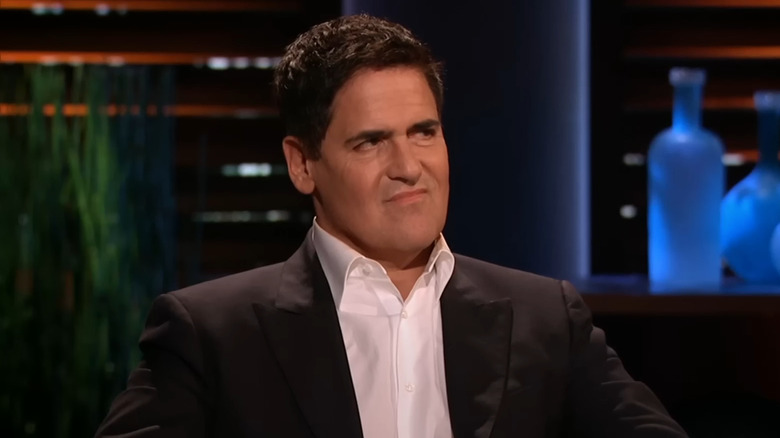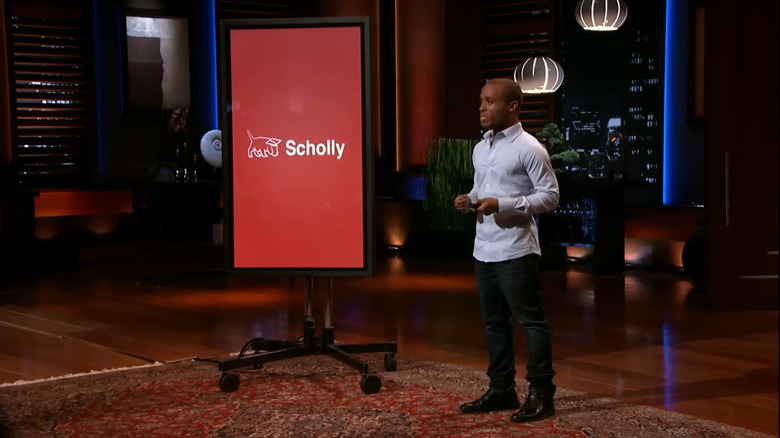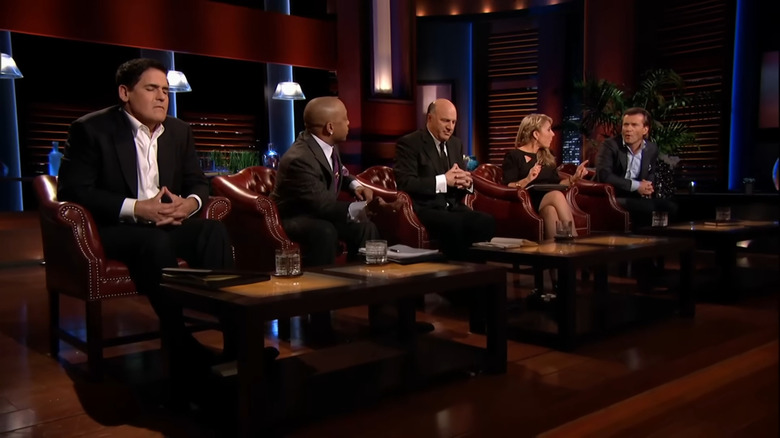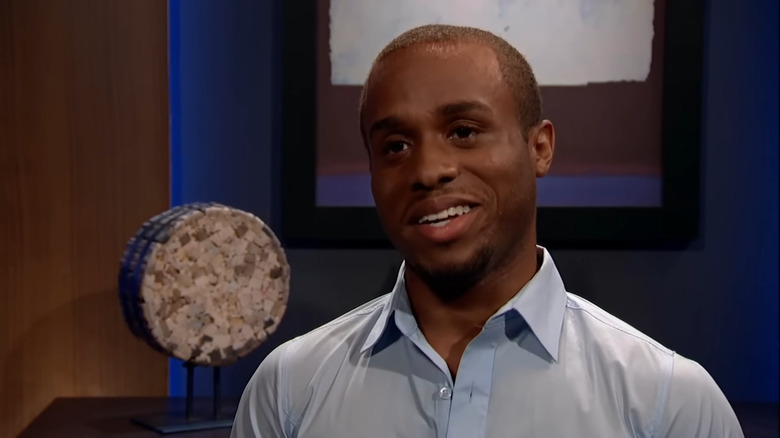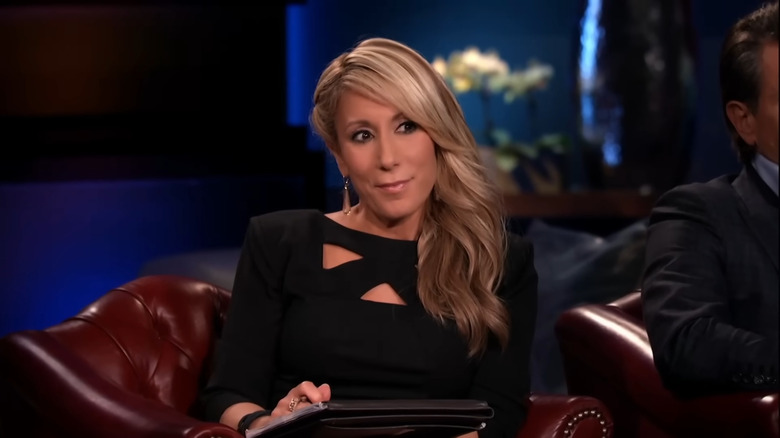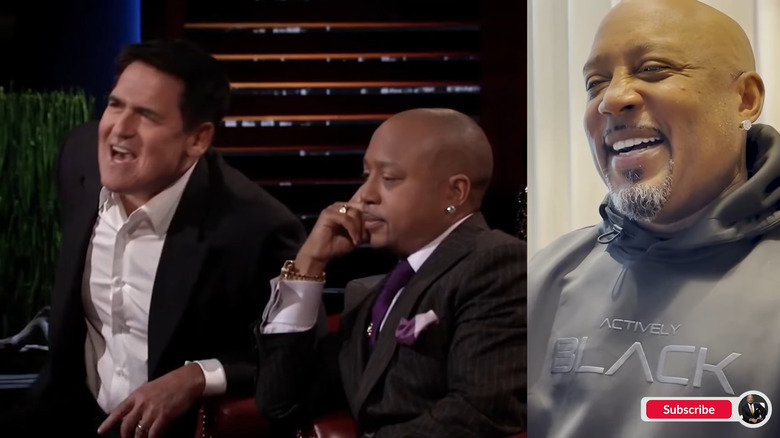Whatever Happened To Scholly After Shark Tank?
Here's a headscratcher for our readers: How did a small tech startup with a valuation of less than $300,000 cause "one of the biggest fights" in "Shark Tank" history and still walk away with a deal? The answer can be found in the app, Scholly.
Back in 2015, CEO Chris Gray (just a college junior at Drexel University at the time) was already experienced when it came to finding and taking advantage of college scholarship opportunities. Raised by a single mom, Gray and his two siblings grew up in what he described as a "low-income" household. Despite his GPA, he was barred from applying to certain schools due to application fees.
Thus, Gray threw his effort into seeking out and applying to as many scholarships as he possibly could, winning a staggering $1.3 million in education funds. It was around this time that he realized others in similar circumstances could find success if only the process of finding scholarships were more accessible and centralized. He teamed up with two web developers to create an app that acts as a database and scholarship search engine, capable of matching up any hopeful college student with the scholarships that can help them achieve their goals.
Scholly's Shark Tank pitch was quick and direct
When Chris Gray came into the "Shark Tank" with his app Scholly, he had a relatively modest ask. All he wanted was just $40,000 in exchange for a 15% stake in his business.
The functionality of Scholly was quite simple: College applicants would enter demographic information (such as age, gender, race, GPA, etc.) and be given a list of appropriate scholarships pulled from the app's extensive — and, at the time, manually curated — database. The applicant could then click on any one of those scholarship opportunities and find an online portal to submit an application or information on deadlines and required materials.
This was essentially all Gray could get out before Lori Greiner stopped him to offer exactly what he came in looking for: $40,000 for 15%. In true Greiner fashion, she pushed Gray to close the deal immediately, discouraging him from waiting to hear what the other "Sharks" had to say. This created palpable tension amongst the panel, though Daymond John broke through the noise to eke out his own offer identical to Greiner's — then quickly folded her into the deal so Gray could get two "Sharks" for the price of one. Visibly caught off guard, Gray accepted their offer and left the "Tank" jubilant. Little did he know that he'd be followed by three millionaires in opposite moods.
Lori Greiner and Daymond John created tension with their Scholly offer
The instant Lori Greiner made her first offer for Scholly, the series' editors cut to Mark Cuban, who was apparently incensed by the move. Robert Herjavec appeared to feel similarly, and both men capitalized on Chris Gray's hesitation to accept the first deal to probe him about the technological backend of his app. Though Gray tried to respond (and appeared more than capable of doing so), Greiner — and then John — pushed hard for him to accept their offer without any further discussion.
After Gray left the "Sharks" to stew in the aftermath of the deal, Herjavec and Cuban didn't hesitate to express their frustration that their peers had forced an offer without giving the room a chance to ask questions, process and investigate claims, and compete fairly for the investment opportunity. They even accused the pair of merely offering the cash as charity. Greiner and John, however, felt they were merely playing the game the way they wanted to, and saw something in Scholly that didn't necessitate further discussion. The discussion got so heated that Herjavec — per his own words — had to leave the set in order to stop himself from saying something nasty to Greiner. A flustered Cuban was close behind, followed by Kevin O'Leary. The two remaining were certainly baffled by what they'd seen, though neither one could stifle a stunned smile, obviously happy with their decision to invest in Scholly.
Scholly closed the deal after Shark Tank
Just because a company appears to make a deal on "Shark Tank" doesn't always mean the partnership will continue after the cameras stop rolling. As "Shark Tank India" contestants are currently learning, a handshake deal on the show is tantamount to the investor expressing interest in closing a deal at some point in the future — after further investigation, often months after their episode airs.
Luckily for Chris Gray and Scholly, the deal with Lori Greiner and Daymond John appears to have closed officially. The former investor has the business listed on her website as one of her featured projects, while the latter has spoken about his involvement (albeit vaguely) on his YouTube channel. The app also experienced an expected increase in popularity, thanks in part to the famed "Shark Tank" Effect, as well as the unique press revolving around the conflict it incited on set. As Business Insider described the scene, "The Sharks regularly battle each other for deals, but it was the first time a fight got personal." Meanwhile, in a statement to Business Insider, Greiner downplayed the incident, likening the investors to a family that occasionally disagrees passionately with one another.
Gray was amused by the bickering, though he maintained in the aftermath that he could have answered the questions Cuban and Herjavec were trying to pose — he just didn't feel he needed to after he secured the offer he was looking for. It probably doesn't hurt that the press storm surrounding Scholly helped launch it to the #1 spot on the app store after the episode aired.
Scholly is still available to help you find scholarships -- for a price
As of writing, Scholly is still operating, though it's no longer a $0.99 service as it was when Chris Gray entered the "Shark Tank." As Lori Greiner was trying to convince Gray to take her deal, she insisted multiple times that she wasn't concerned with how they were going to monetize the app — at least, not immediately. After a three-day free trial, Scholly will begin charging applicants depending on if they've chosen a month-to-month, bi-annual, or annual subscription ($4.99/$24.99/$34.99).
On the Google Play and Apple App stores, users have reacted to this development with frustration, questioning why a service targeted toward those struggling to afford college now has a persistent cost barrier. Some users have also alleged serious bugs, such as app crashes, users getting paired with scholarships they aren't eligible for, and — in one case — a customer's card being charged for months after they canceled their subscription. Scholly has recently released an update, which they say contains a litany of bug fixes.
That said, as of 2021 Scholly had helped connect students with over $100 million worth of college scholarships and has seen its downloads increase by the hundreds of thousands since the company's appearance on the show. They've also taken steps to provide their own scholarship opportunities to applicants.
Scholly's next steps (and a Shark's reflection)
For Scholly to remain a valuable service to college applicants — especially at a considerable price point for those who need it most — they will need to address backend technology issues that might prevent students from being able to find scholarships that are actually useful to them. While Daymond John and Lori Greiner were seemingly correct in their instincts to go after Chris Gray's business, it's worth noting that backend tech issues were exactly what Mark Cuban and Robert Herjavec (two tech entrepreneurs themselves) wanted to inquire about.
However, in 2022 John reviewed the initial 2015 pitch and the fight it caused on his YouTube channel, providing more perspective several years down the line. As he explains, it may have been Cuban and Herjavec's familiarity with tech that prevented them from acting fast enough on Scholly, comparing the situation to one where he (a fashion mogul) thought Herjavec was making a mistake by investing in a certain clothing business due to the fine details. That business wound up becoming successful, just as Scholly has.
Scholly's biggest competition comes from free scholarship databases that — while less exhaustive in their offerings and occasionally more difficult to use — have the benefit of operating at no cost to the consumer. An ambitious approach could be to mimic a company like Common Application, which has been able to streamline the process of applying to colleges — perhaps something similar could be done for larger scholarships.
